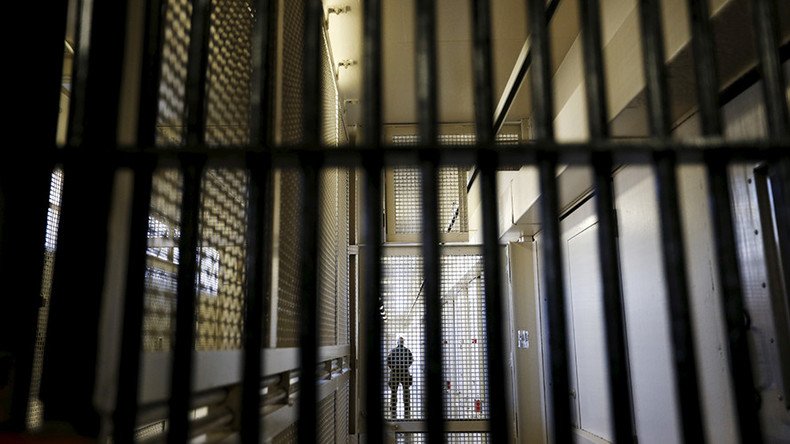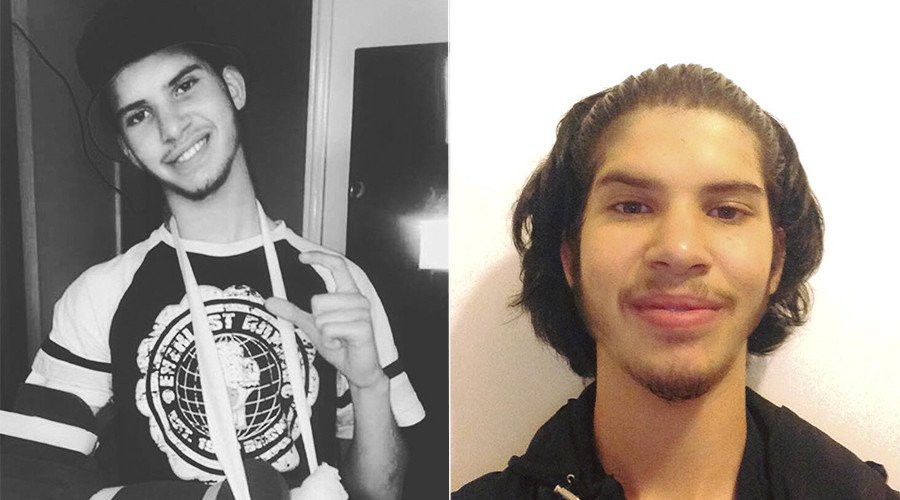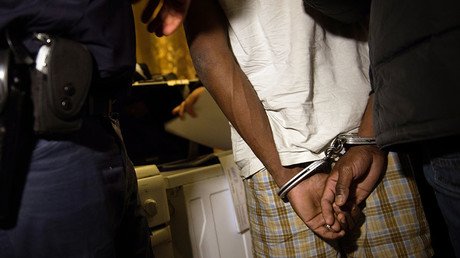11 black men jailed for killing under controversial 'guilty by association' law

Some of the young black men jailed for the killing of Abdul Hafidah under joint enterprise law were convicted through racial stereotypes linking them to a gang and have been found “guilty by association,” their families say.
At Manchester Crown Court on Thursday, Devonte Cantrill, 20, Delroy Wright, 18, Durrell Ford, 20, Nathanial Williams, 19, Renau Walters, 19, Trey Wilson, 19, and Durrell Goodall, 20, found guilty of murder, were sentenced to between 16 and 23 years.
Remekell Samuels, 19, Devonte Neish, 18, William George, 21, and a 15-year-old boy who cannot be named for legal reasons, found guilty of manslaughter, were sentenced to between five and 12 years.
Cantrill, of no fixed address, was the only defendant in possession of a knife, which was used to fatally stab Hafidah.

In a statement to RT, a family group representing some of those convicted say they were “prejudged because of the color of their skin or where they are from.”
“They are not in gangs. Most of the young people in this trial had no previous contact with the police, or intelligence linking them to gangs. They were going to college, had jobs, played football.
“In trying to convict all the boys in this trial of murder, the prosecution has relied on the story that they are in gangs. Without clear evidence to demonstrate their intent or culpability, the prosecution has based the story on speculation and prejudice about the lifestyles of young men living in South Manchester.
“They are not guilty by association.”
On May 12, 2016, Hafidah, 18, was stabbed on Moss Lane East in South Manchester and later died in hospital. Thirteen people were charged with his killing, but two were acquitted.
Hafidah’s family did not respond to RT’s request for comment on the sentencing. In a statement outside court in August, his parents remembered their “selfless” son who was “always putting everyone before himself.” They said he “cherished the good time spent with family and friends, and was always smiling and laughing.”
Hadifah’s parents said after a long investigation and trial, they are relieved justice has been done and those responsible have been held to account for their actions.
“We do not hate those involved, but we hate what they have done. They have not only taken Abdul’s life at a time where he had so much to live for, they have ruined our lives as well as theirs and their families.”
Under joint enterprise, if prosecutors can demonstrate that a group of individuals held a ‘common purpose,’ then they can all be held liable for crimes committed by just one person, even if they did not personally take part and did not even want the crime to take place.
The doctrine does not require proof that a defendant intended someone’s death. It only requires the defendant to foresee that one member of a group might intentionally cause someone else serious harm.
Last year, the Supreme Court ruled that joint enterprise law had been “misinterpreted” for three decades, having taken a “wrong turn” in the 1980s. The campaign group JENGbA, Joint Enterprise Not Guilty By Association, says the doctrine has led to widespread miscarriages of justice.
Spokesperson Jan Cunliffe says a “lack of solid, physical evidence” secured a conviction, and the “gang narrative played out to the same racist tune it always has done.”
“There is no greater injustice than losing a child to murder, and everyone connected to this case will express the greatest heartfelt sympathy to Abdul Hafidah’s family. To have to carry the burden of injustice does not give anyone justice, it just delivers further pain.”
Joint enterprise disproportionately affects black men - research
Becky Clarke, a senior sociology lecturer at Manchester Metropolitan University, says joint enterprise law is disproportionately applied to black and ethnic minority (BAME) men, with the racialized narrative of the “gang” central to prosecutions.
Clarke, who has been part of a group supporting the families of those convicted, says their conviction under joint enterprise law relied heavily on an assumption that they were part of a gang, which was based on “prejudices and speculation” and in the case of many of the young people “lacking any hard evidence.”
A document on the trial produced by the family support group says CCTV footage shown in court of one young man borrowing a bicycle from another was turned into a gang sharing vehicles in a “pool.” It says defendants were portrayed as liars on the witness stand when they claimed to have no knowledge of gang crime in the area.
For many of those convicted, there is no forensic or CCTV evidence of them engaging in violent behavior in the lead-up to Hadifah’s death, the group says.
Clarke says it is like “Somebody almost made a decision to draw a line around 13 people ‘we want to see found guilty of this murder’ - and I don’t understand that as much as I would like to.
“I would like to know what’s going on in that process, in that space, between the police and the Crown Prosecution Service (CPS) that makes that decision and views it necessary for justice to be done.”
Clarke’s research, co-authored by Patrick Williams, ‘Dangerous associations: Joint enterprise, gangs and racism,’ shows while the gang label is disproportionately applied to young black men on police databases in Manchester, Nottingham and London, black people are not responsible for the majority of serious violence in these cities.
In Manchester, for example, 89 percent of the gang database was black or minority ethnic, but only 23 percent of those convicted of serious youth violence were.
Labour MP David Lammy’s justice review, published last week, criticizes the criminal justice system for “overt discrimination” against BAME communities. It says joint enterprise is being disproportionately applied in cases involving groups of young black people, which has contributed significantly to the high level of young black males in jail.














